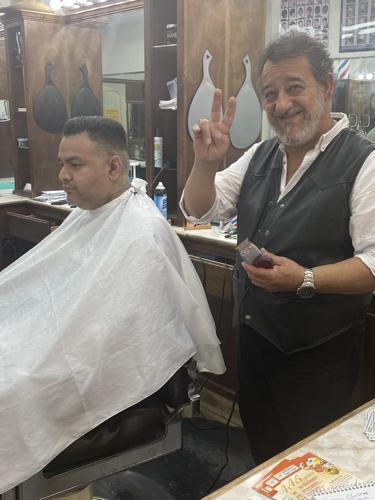Central Avenue in Downtown Phoenix is still relatively calm at 10 a.m. on a Wednesday and Eduard Zavurov, owner of Downtown Barber Shop, takes advantage of the quiet to spotlight a collage of family pictures on the wall as he preps for his first customer.
He first singles out an 1890 photo of his great-grandfather, the man who began the family barbering tradition in Uzbekistan.
“That’s my great-grandfather, and that’s his son, my grandfather, who died when he was 27,” he said in a heavily accented voice. Before his early death, he taught his wife, Zavurov’s grandmother, how to cut hair. “She was a barber for 65 years — no stop,” he added.

A collage of family photos on the wall of Eduard Zavurov’s Downtown Barber Shop is pictured.
“My father was 60 years a barber — no stop,” Zavurov continued. He explained that his father was so well-regarded as a barber in Tashkent, Uzbekistan’s capital city, that customers had to book an appointment for his services — an unusual prerequisite for Uzbek barbers.
“He was super famous barber, like Michael Jordan in basketball,” Zavurov said, before pointing to another photo. “That’s my mom. My father teach my mom and she teach me. In 1975, I start to be a barber.”
His sister and brother also learned the trade and now he’s passed it on to his two adult sons, thereby creating a fifth generation of barbers.
He’s wrapping up his soliloquy as Tony Olvera, a customer, enters the shop and says a quick hello before sliding into his regular chair to await a haircut. He doesn’t need to ask Zavurov where to sit because for the last 15 years or so this has been his weekly routine, interrupted only when the early stages of the COVID-19 pandemic forced Zavurov to close the shop for three months.
Even after reopening under the mask mandate, that period wrought devastation for Zavurov, especially for his plans to retire early.
Before COVID, the shop supported Zavurov, his son, two other barbers and a shoe-shine man. “He was amazing guy, unbelievable shine,” he said.
The chairs were always full and both he and Olvera remembered a shop full of loud conversation and laughter. Men — and women with short hair — walked in every day of the week and waited for one of the barbers to fit them in.
Zavurov talks about that time wistfully. The other barbers left and the shoe-shine man moved back to Missouri.
“It’s just me now,” he said. “Sometimes Arthur, my son, comes to help me. He has his own spot in Scottsdale.”

Eduard Zavurov and his son, Arthur, prepare to cut customers' hair in Downtown Barber Shop on Central Avenue on Wednesday, Sept. 21, 2022.
Zavurov plans to retire in February and Arthur will take over.
These days, however, Zavurov is usually alone and cannot handle much walk-in traffic. So, like his father before him, he instituted a by-appointment-only rule.
Downtown Barber Shop sits at the foot of Hotel San Carlos, a historic — and supposedly haunted — hotel and tourist attraction. The area was once bustling with people going to work at places like Chase Tower, U.S. Bank and Wells Fargo. Chase was already in the process of moving workers to its Tempe campus when the pandemic hit and many other employees have not returned to downtown offices and are still working from home.
“COVID, a little bit, destroyed my business,” he said.
Zavurov emigrated to the United States from Uzbekistan in 1988. He arrived in New York and though he knew no English, he found a job as a barber right away.
“Because of my work, my talent in my hands, these Italians hired me right away. No English, no license, nothing and I started working,” he said.
He said that’s one of the best things about being a barber and why it’s one of the few professions to be passed down through generations.
“If I go to Japan right now, I don’t speak Japanese, but I can be busy and make money.”
He left New York — “the weather was not for me” — and headed west for Arizona’s warmer and drier climate.
Zavurov speaks Uzbek, Russian, English and, as a Bukharan Jew, he also speaks Farsi. When he first came to Arizona, he was drawn to Chabad and its Russian-speaking rabbi. Now he attends Beit Midrash, a synagogue with a large Bukharian congregation.
He first set up a barber business on 24th Street and Campbell Avenue. He moved to another location a few years later, but when he learned that the downtown shop was for sale, he snatched it up in 2004.
He liked the historic nature of the shop, which originally opened in 1928 under the name San Carlos Barber Shop. He also liked the association with Hotel San Carlos because his parents had worked in hotel barber shops in Tashkent.
Zavurov developed a loyal customer base in 18 years downtown, too.
Olvera said the first time he came, “I just liked the look of the shop, and I was looking for a new barber so I came in to try it out. I’ve been coming ever since.”
Aside from the three months in 2020 when the shop was closed and he had to cut his own hair, Olvera said he only went to another barber once.
“And Eddie had to fix it,” he laughed.
Arthur said his parents — his mother also cuts hair — encouraged him to work as a barber while he went to Paradise Valley Community College. He hesitated initially, but by his third semester he got his barber’s license and started working part-time. That eventually turned into full-time and soon, he was so busy he had to choose between college and his profession.
He chose the latter and said he’s happy with his decision.
“I had my first shop 11 years ago, and now I have a shop in Scottsdale on Shea and Scottsdale Road,” he said. Soon he’ll be running Downtown Barber Shop, where he hopes to hire more barbers. Arthur’s wife also cuts hair.
Zavurov’s youngest son moved to San Diego with his wife and children. He has both a barber and real-estate license there.
Zavurov said his sons were always free to choose their own paths, but being a barber “is a unique profession” and will serve them well no matter where they might end up.
“When you don’t have the language and you have only your hands, you just work and you’re busy, busy. Not everyone can have that option,” he said. JN








